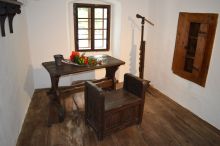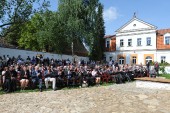Master Jan Hus is one of the most outstanding and important figures in Czech history. He was born around 1371 in Husinec in Southern Bohemia, attended school in Prachatice, and then studied in Prague, where he was awarded a bachelor’s degree in 1393 and a MA in 1396. He lived during the reign of Wenceslaus IV, but was greatly influenced by the enormous advances made in all areas of life during the reign of Wenceslaus's father, the Bohemian King and Holy Roman Emperor Charles IV (1346-1378). Under Charles, Prague became the centre of the Empire, Prague’s New Town was built, the bishopric of Prague was elevated to an archbishopric, and in 1348 a university was founded there.

Charles IV was a devoted Christian and genuinely wished to see a reform of the church. He personally permitted reforming preachers to preach, or at least gave them moral support; these included, for example, Conrad Waldhauser (died 1369) and Milíč of Kroměříž (died 1374). Milíč even founded a community called “Jerusalem” for repentant fallen women, where the renewal expressed in his sermons found practical expression. Another important figure, and a contemporary of Hus, was Matthias of Janov (died 1394), who recommended frequent communion.
With Hus himself and in all aspects of the Czech Reformation, the practical implementation of these attempts at reform in the spirit of Holy Scripture and the tradition of the church became one of the main objectives; this connection between life and faith is the main characteristic of the Czech Reformation.
In 1397-1398 Wenceslaus IV and his court went on a journey to France, and Jan Hus went with them. After his return he started to lecture at the university, and in 1400 he was ordained priest. In the winter semester of 1401-1402 he was Dean of the Faculty of Arts. Starting in March 1402, he was active for more than ten years as preacher at the Bethlehem Chapel, which had been established in 1391 with the express stipulation that the word of God should be proclaimed in the Czech language.
At the beginning of the fifteenth century, Wyclif´s writings began to circulate in Bohemia. The main points in them to have an influence on Hus were the fervent desire to establish order in the church and the criticism of the actual state of the church. Hus did not accept some of the more radical of Wyclif´s new ideas at all (for example, Wyclif’s rejection of transubstantiation), and continued to adhere to the tradition of the church. However, in view of the lack of order in the church, which had at first two, and then later three popes, Hus was enthusiastic about Wyclif's view that the church is an invisible community preordained for salvation, and that if the visible church is not capable of living in accordance with the Gospel on its own, then the secular authorities should restore order, and that it is not official authorization which qualifies anyone to exercise an office, but their moral qualities. Hus was not, as is often asserted, a mere epigon of Wyclif, but he was attracted by Wyclif's way of thinking, because his philosophical and spiritual roots were similar: he tended towards Platonism and admired St. Augustine, just as Wyclif did.
At first, the Archbishop of Prague, Zbyněk Zajíc of Hazemburg, supported Hus' critical views; indeed, he twice appointed him as synodal preacher for the clergy of the Prague archdiocese. But then came the disputes over Wyclif, which started in Prague University in 1403, with the Czech masters defending Wyclif while the others made him out to be a heretic. In 1406 Archbishop Zbyněk tried to put an end to these disputes by banning Wyclif’s views which provoked a rupture between Hus and the Archbishop.
Hus’s opponents were particularly annoyed by the fact that he voiced his criticisms of them not only in the university and at synods (such criticism was not only usual but even ”fashionable“ in intellectual circles), but also in Czech from the pulpit in Bethlehem Chapel. Hus’s activities in Bethlehem Chapel gave rise to sermons preached on Sundays and holy days, Czech versions of some Latin mass hymns (such as “Jesus Christ, generous priest,”) and moralist tracts such as “Ten gold pieces” (a reworking of an older version), “On the seven deadly sins,” “A small mirror for a sinner,” and the tract “On the prevention of escheatage,” directed against the accumulation of church property.
After 1408 the attacks of Hus’s enemies, who came mainly from the ranks of the regular (monastic) clergy, began to increase. The reason for this was the preacher’s moral frankness and refusal to compromise, while the pretext given was that in many of his criticisms he was indeed plainly close to the views of Wyclif, who had been banned in both England and the Czech lands, although by now he had been dead for some time (he died in1384).
At the beginning of 1409, Wenceslaus IV tried to get Prague University to add its support to the French proposal for resolving the papal schism, which he himself supported. (The proposal was that both rival popes should resign and that a new one be elected.) His efforts, however, were thwarted by the opposition of the German masters, which led him to issue the Kutná Hora Decree on 18 January. By this decree Wenceslaus assigned three of the four votes in decisions taken by the university masters to masters coming from the Kingdom of Bohemia. In this way he ensured the support of the University for his favoured solution to the papal schism. In accordance with the new regulations, Jan Hus was elected Rector of Prague University that autumn.
In 1410, the Archbishop ordered Wyclif's books to be burned. Hus protested against this from the pulpit and, as a consequence, was anathematized by the Archbishop. Hus, however, continued in his activities and even wrote a tract on this subject (“De libris hereticorum legendis” – “Concerning the reading of heretical books”). The Archbishop then brought a complaint against Hus before the new pope, John XXIII, and Hus was summoned to appear before the papal court. However, he did not go; on the contrary, he became even more active in the University and the Bethlehem Chapel, writing a further tract entitled “Replica contra ocultum adversarium” (“Response against hidden enemies”). The Archbishop intensified the anathema against Hus, had it confirmed by the pope, and had it proclaimed in all the churches in Prague in March 1411. The angry king expelled Archbishop Zbyněk Zajíc from Prague. The prelate fled to King Sigismund in Hungary, but died on the way.
Albík of Uničov was appointed as the new Archbishop, but the situation in Prague did not become any calmer. Indeed, if anything, it became more acute.
In 1412, papal emissaries arrived in the city with a papal bull authorizing them to sell indulgences. On 7 June, Hus spoke out against this simony in a public disputation, making use of the ideas of Wyclif. Some of the University masters (such as Štěpán Páleč and Stanislav of Znojmo) openly condemned several of Wyclif's main theses. Hus championed Wyclif's cause, publishing his tracts on this subject under the title “Defensio quorandum articulorum Joannis Viklef” (“A defence of some off Wyclif's articles”). The dispute now took a turn for the worse.
In July, Hus presided over the funeral in Bethlehem Chapel of three craftsmen, Jan, Martin, and Stašek, who had been arrested during riots caused by the indulgences and then executed under sinister circumstances. Prague was placed under interdict (no church offices, including baptisms, funerals, and masses, were allowed to be held in the city while Hus remained there), and the king was also threatened with a papal anathema. Hus therefore left Prague in November. Before leaving, he took a step which truly made him a reformer “in the grand style” he appealed to a higher authority, which is not recognized in canon law, but which is the decisive one for every Christian: to his personal saviour and judge Jesus Christ (18 October 1412). After his departure he stayed mainly in the countryside, especially in Kozí Hrádek near Tábor, but he often travelled to Prague, for the situation there had quietened down somewhat.
During his stay in the countryside Hus preached in the Czech language to the ordinary people and also produced a number of writings. In 1412, he wrote “The Creed, the Ten Commandments and the Paternoster,” and “The three-source string,” the following year “Concerning simony,” “A large mirror for a sinner,” “Daughter,” and “Concerning the six heresies,: and in 1414 “The essence of Christian teaching.” In the winter of 1412-1413 he produced the important Latin tract “De ecclesia” (“Concerning the church,”) which summarizes his teachings. Although in form this work owes much to Wyclif, whom it often quotes or paraphrases, it is an original work of some consequence. Of course it is not always in agreement with church traditions, but its basic intention is clear: it wants a church without stain or blemish. In 1413 Hus also wrote several responses in Latin to the accusations of his opponents.
In the autumn of 1414, a Council was convened in Constance, so that order might finally be restored in the Church. Hus decided to travel to the Council. From the summer of 1414 onwards he lived near Rakovník in the mansion of Krakovec, preached in the area, and prepared for the journey to Constance. It was at this time that he wrote the famous “Sermo de pace” (“Discourse on peace,”) with which he wanted to address the Council.
On 14 October 1414, Hus set out from Prague, in the company of leading Czech nobles. On 3 November, he arrived in Constance, but on 28 November he was arrested and kept in prison in various places in and around the town. On several occasions he was called before the Council and put under pressure to recant his views. While in prison he wrote several shorter tracts and a number of moving letters. He refused to recant, asking for an explanation of where he was in error. He was condemned as an intractable heretic and burned at the stake on 6 July 1415. Afterwards, his ashes were scattered in the Rhine.
Hus’s death provoked riots in the Czech lands and led to conflicts which lasted for centuries. However, it did demonstrate the genuine commitment - as we would say today ~ of Master Jan Hus to the truth of Christ and to a genuine, pure and moral life of the individual and of society, for which he was prepared to sacrifice his own life.







